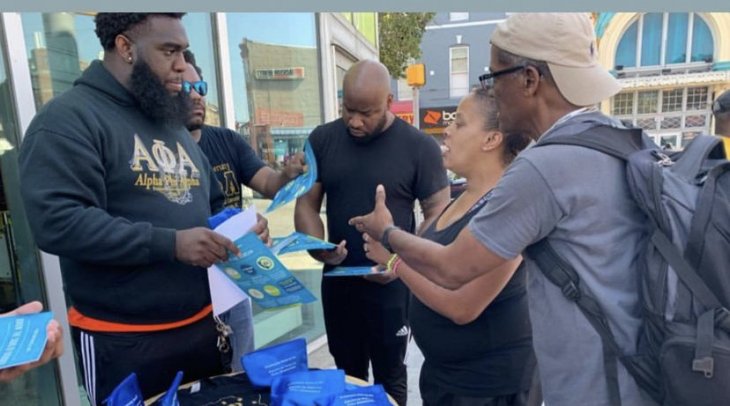Baltimore City’s Response to the Opioid Epidemic

Baltimore City’s Response to the Opioid Epidemic
The Baltimore City Health Department is committed to preventing overdose deaths in Baltimore City. In 2023, Baltimore City saw 1043 drug and alcohol-related deaths, 921 of which were Fentanyl related. (Data sourced from the Maryland Department of Health Overdose Data Portal, which was last updated in August 2024. Counts for 2022-2024 are preliminary and are subject to change as OCME death investigations are finalized.) For more information, please visit the link here.
Baltimore’s aggressive five-pronged strategy for responding to the opioid epidemic has been recognized nationally. When building and implementing our response, the Baltimore City Health Department has prioritized bringing community members to the table, as a community in crisis requires a community solution.
OUR 5 PILLAR STRATEGY:
- SAVING LIVES WITH NALOXONE: When administered to an individual experiencing an overdose, this antidote medication can take them from near-death to walking and talking in a matter of minutes. Our priority is saving a life today to make better choices tomorrow.
- INCREASING ACCESS TO ON-DEMAND TREATMENT: The Baltimore City Health Department endorses evidence-based medication-assisted treatment (MAT), along with social and wraparound services, to treat the disease of opioid addiction.
- FIGHTING STIGMA THROUGH EDUCATION: We know that addiction is a disease. That isn't a slogan or a campaign but a statement rooted in concrete facts. Similarly to heart disease, addiction is preventable and treatable. We aim to fight stigma and misinformation through education.
- PREVENTION: Prevention plays a vital role in combating the opioid epidemic. We aim to stop substance misuse before it begins through prevention and early intervention strategies that can reduce the impacts of substance use and mental health disorders. Our team's primary prevention focus is the emerging adult population in Baltimore City through our Kids Off Drugs Program. To learn more about KOD, click here.
- DATA: We commit to investigating data and trends that inform health strategies to increase the quality of life for all residents of Baltimore.
Community Risk Reduction Services
The Community Risk Reduction Services, formerly known as the Health Department Needle Exchange Program, aims to lower incidences of HIV, hepatitis C, and other blood-borne infections that are caused by the use of contaminated needles. The program provides clean syringes and allows the disposal of used syringes to those who are drug-dependent. Needle Exchange also refers clients to drug treatment centers and includes testing for syphilis and HIV. All clients are trained to reverse opioid overdose with naloxone.
Staying Alive Overdose Response Program
The program, launched in 2004 by the Baltimore City Health Department, aims to reduce opioid-related deaths in Baltimore. Run by Community Risk Reduction Services, the Staying Alive staff trains people to recognize opioid and heroin overdose signs and respond effectively to save lives. Training sessions, which include access to naloxone (Narcan), are held at various SEP sites, partner locations, and online. In 2015, the program received state certification to train third parties and individuals with substance use disorders on Narcan administration.
Since 2015, BCHD has trained 43,591 people. From 2015 to 2024, BCHD and its partners trained over 163,464 Baltimore residents, contributing to more than 18,000 overdose reversals.
K.O.D. (Kids Off Drugs)
K.O.D. (Kids Off Drugs) is a high-energy, school-based initiative that helps youth and young adults avoid or reduce substance use. The program helps young people learn about the history of drugs in Baltimore and the cultural norms that lead to substance use. Inspired by the Grammy Award-winning rapper J-Cole and his album "K.O.D. (Kids On Drugs)," our program integrates Hip-Hop and Baltimore culture—including language, arts, and history—into a social, cultural, and contextual framework for addressing substance use.
Healthcare On The Spot
The Healthcare on The SPOT Mobile Unit: The SPOT mobile van team provides low threshold treatment for Substance Use Disorder (SUD), prescribing Buprenorphine and ensuring all patients receive the best treatment options. All patients are seen, regardless of insurance. The team offers confidential services such as:
- STI/HIV testing and treatment
- PrEP and PEP for HIV prevention
- Hepatitis C testing and treatment
- Buprenorphine
- Wound care
- Case management
Call (410) 340-9445 or (410) 241-7240 for van schedule & locations
File(s) available on this page for download requires special software to view. If you do not have that software, you can obtain it from the following source(s):
Portable Document Format (PDF): https://get.adobe.com/reader/
